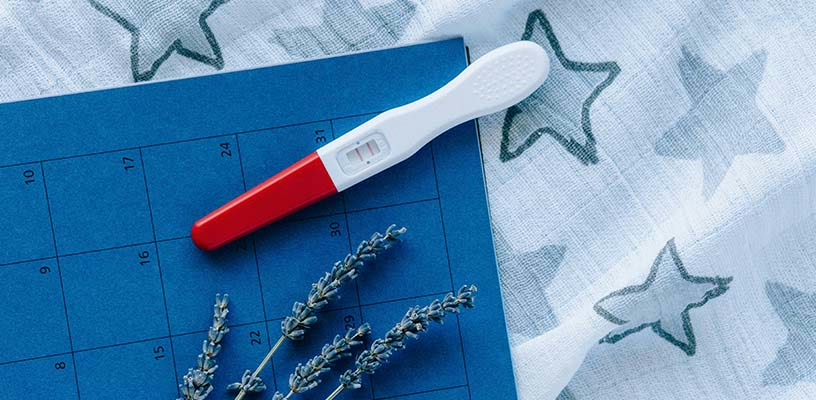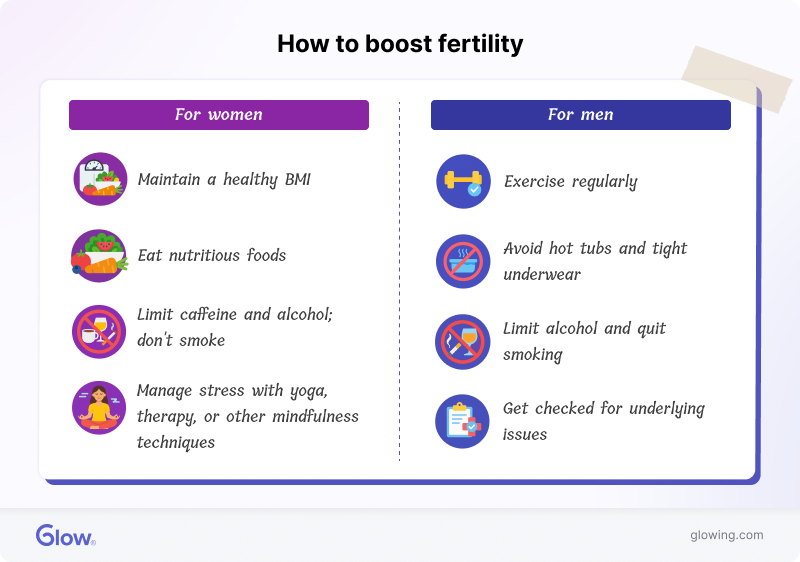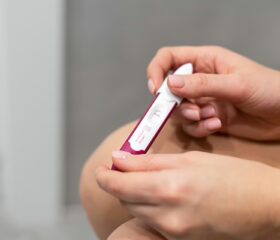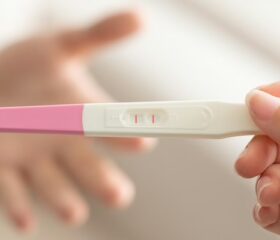How Long Does It Take to Get Pregnant?
Deciding you want to bring a little bundle of joy into the world is exciting, but the early days of trying for a child can be stressful—especially if it takes you longer than expected to conceive.

Many factors affect how quickly you get pregnant, including plain old luck. Some women conceive within months, while for others, it might take much longer. Let’s take a look at what contributes to you getting pregnant and how you can up your chances of getting that bun in the oven.
What are your chances of getting pregnant?
You might be surprised to know that pregnancy doesn’t usually happen as soon as you stop using birth control. Studies show that around 75% of couples trying to conceive get pregnant within six months. This increases to 90% after a year and reaches 95% in two years. 1
However, these figures are just averages, and your experience may differ.
Factors that affect your chances of conceiving
Several factors affect how quickly conception happens, such as:
- Age: You’re at your reproductive peak in your late teens until your late 20s. After that, your fertility (your ability to get pregnant) naturally starts declining. 2 After 35, your body has fewer eggs, and the likelihood of abnormalities (such as the wrong number of chromosomes) tends to increase. This is especially true after the age of 39. Age can also adversely affect fertility for men, although not in the same ways.
- When you have sex: As you’d expect, you’ll be more likely to get pregnant if you have sex in the days leading up to ovulation, when you’re most fertile. However, the window is wider than you may expect; in general, it’s around 5 days prior to and 1 day after ovulation. This is because sperm can survive in the vagina for up to 5 days, and eggs can survive about 24 hours after ovulation. 3
- Underlying health conditions: Diabetes, kidney disease, low sperm count, and erectile dysfunction are some of the things that can affect male fertility. On the other hand, fallopian tube obstruction and irregular ovulation are a few factors that can affect a woman’s chances of getting pregnant. 4
- Lifestyle: Your weight, diet, stress levels, smoking habits, caffeine intake, and the use of other substances (including marijuana) can all affect your chances of pregnancy.
Polycystic ovary syndrome
One common challenge many women face when trying to get pregnant is polycystic ovary syndrome (PCOS). The hallmark of this condition is irregular ovulation.
PCOS is a complex syndrome typically associated with being overweight or obese, higher than normal androgen levels and its associated symptoms (such as acne and male-pattern hair growth), abnormal sugar processing, and—of course—difficulty getting pregnant due to not ovulating regularly. 5
While there’s no cure for PCOS, its effects can be managed with medication and healthy lifestyle changes (which means you can get pregnant with PCOS). If you’re having fertility issues, talk to your OB about it; they’ll test you for PCOS and recommend a course of treatment if you have it.
Does birth control affect your future fertility?
Most birth control methods are reversible and won’t affect your future fertility. 6
Of course, that somewhat depends on what birth control you’re using. If you’re using the pill, for example, the effects won’t go away the second you stop taking it, but you should be able to get pregnant within a few months (a year at most). 7
How to maximize your chances of conceiving
While some factors are beyond your control, there are steps you can take to increase your chances of getting pregnant.
There are also “soft markers” you can monitor, such as by tracking your menstrual cycle and basal body temperature. Of course, these are only soft markers, so they are by no means a guarantee or even the most recommended way of improving your fertility.
Tracking your ovulation
If you want to get pregnant, the timing of when you have sex is more important than how often you have it. Time intercourse around ovulation for the best chances of conceiving (bear in mind that sperm can survive in your reproductive tract for up to 5 days). 8
Here are a few ways to get to grips with your fertile window:
- Calendar method: If you have a regular cycle (roughly every 28–35 days), ovulation typically occurs on cycle day 14. 3 You can also use an online ovulation calculator or fertility tracker app to do the tracking for you and narrow down your ovulation window.
- Ovulation test strips: You can use an ovulation test strip or ovulation predictor kit (OPK) to track your luteinizing hormone (LH) in your body, which spikes roughly 24–36 hours before ovulation. 9 This can give you a heads-up that it’s time to try.
If you have any questions about how to time intercourse with ovulation, ask your OB/GYN.
You should also let your doctor know if you’re trying to track ovulation and you have PCOS, as that can make it harder to use these traditional tracking methods.
Tracking your “wet” days
Have you noticed that during certain times of the month, your vagina is dry, while at other times, you have more discharge than usual? Tracking your cervical mucus is another way you can find out the ideal time to have sex. Ovulation discharge—which, when it’s healthy, should be clear and slippery—is your body creating the ideal environment for sperm to reach and fertilize your eggs. 10
Basal body temperature (BBT) method
Another way to track your fertility is by measuring your basal body temperature (BBT) when you wake up in the morning. You can do this with a basal thermometer, which is inexpensive and available at most pharmacies.
Your BBT may increase for a few days after you ovulate. In many (although not all) women, pre-ovulation, it hovers around 96–98 degrees Fahrenheit, and reaches an average of 97–99 in the days afterward. 10
Tracking your temperature for several months can make it possible to predict when you’ll ovulate, assuming your cycle is regular. When your calendar shows that you’re due for an uptick in your BBT in a few days, it means that you’re at your most fertile point and should try to conceive.
Timing is key
For more accuracy, use both your BBT and cervical mucus to determine the ideal time to have sex. You’re most fertile as soon as you get “wet” after your period or 1 to 2 days before you start to get wet. Similarly, you’re most likely to get pregnant 2 to 3 days before your BBT hits its highest point. 10
How to improve your fertility
For women, here’s how to improve your fertility:
- Maintain a healthy weight: Being under- or overweight can affect your hormone levels and ovulation. 11
- Eat a balanced diet: If you’re trying to conceive, fast food won’t cut it. Eat nutritious food to support your overall health and reproductive function, and research what to eat to get pregnant faster so you can make informed choices.
- Manage stress: Though trying to conceive can be nerve-wracking, stress can actually negatively impact your chances of conceiving. 12 Get plenty of exercise (ask your doctor about what activities to include in your pre-pregnancy workout plan), and try out stress-reducing activities like meditation or yoga.
- Go easy on the vices: Smoking, drinking a lot of alcohol, and even drinking too much coffee may all negatively impact the quality of your eggs. 13
Don’t be afraid to ask your doctor for other tips on how to prepare for pregnancy if you have any concerns.
How can men improve their fertility?
For guys, lead a healthy lifestyle to keep your swimmers in check. Get at least 20–30 minutes of exercise 3 times a week and avoid smoking (tobacco and other substances), excessive drinking, and exposing sperm to heat (e.g., by taking long dunks in saunas). 14

When should you seek professional help?
While many couples will conceive naturally, there’s nothing wrong in asking for help from your doctor during a preconception appointment. Here are some potential issues that may necessitate a conversation with your OB:
- Age: If you’re over 35, you should seek a fertility evaluation after 6 months of trying. If you’re 40 or over, it’s worth seeing a doctor as soon as you make the decision to start trying to get pregnant. 15
- Irregular cycles: If you have irregular periods (or don’t have them at all), it’s worth seeing your doctor. Many people have trouble getting pregnant with irregular periods (and it’s often harder to spot the signs of pregnancy when you have irregular cycles even if you do conceive). Luckily, your doctor may be able to help.
- Known health conditions: Conditions such as endometriosis, PCOS, or thyroid disorders also merit a visit with a doctor.
- History of STIs: Sexually transmitted infections (STIs) can affect fertility in both men and women.
- Painful periods: Severe menstrual pain or heavy bleeding may indicate an underlying condition that could impact conception.
In the absence of any of those conditions, see a doctor or fertility specialist if you’ve been unsuccessfully trying to conceive for over a year.
What to expect with a fertility evaluation
If you’re having trouble conceiving, here’s what you can expect: 16
- Your OB will review your medical history and lifestyle, then conduct a physical exam on both you and your partner to identify potential issues.
- They’ll perform a blood test to measure your hormone levels and assess your ovulation and other reproductive functions.
- Your doctor will also test your partner’s sperm to check sperm count, motility, and morphology (shape).
- Your doctor may also use an ultrasound or other imaging tests to assess your and your partner’s reproductive organs.
- If necessary, your OB may also recommend testing for genetic conditions that could affect fertility.
Your doctor may also schedule a saline infusion sonogram (SIS), which is a type of transvaginal ultrasound that allows your doctor to have a detailed look at your uterus to identify any abnormalities or issues.
Many women claim to have increased fertility after an SIS. However, an SIS is only a diagnostic tool, not a fertility treatment itself.
What happens after your evaluation?
Based on the results of your and your partner’s testing, your doctor may recommend:
- Medications: These can stimulate ovulation, improve sperm production, or address underlying health conditions.
- Intrauterine insemination (IUI): This involves placing sperm directly into your uterus.
- In vitro fertilization (IVF): Your doctor will retrieve your eggs, fertilize them with sperm in a laboratory, and then transfer the embryos into your uterus.
- Surgery: In some cases, you may need surgery to correct any structural issues in your reproductive organs.
Final thoughts
It’s understandable if you can’t wait to get pregnant, but try to be patient. You may not conceive straight away. Don’t compare yourself to other couples—just focus on what you can control.
Adopt a healthy lifestyle, have sex often and at the right times, and talk to your partner, family, friends, or a therapist if trying to conceive is stressing you out. The process should still be fun and enjoyable!
Soon enough, you’ll have the best surprise of your life when you finally get that positive pregnancy test result!
Article Sources
- The BMJ. "Extent of the problem" Retrieved April 14, 2025.
- American College of Obstetricians and Gynecologists. "Having a Baby After Age 35: How Aging Affects Fertility and Pregnancy" Retrieved April 14, 2025.
- American College of Obstetricians and Gynecologists. "Trying to Get Pregnant? Here’s When to Have Sex.." Retrieved April 14, 2025.
- Johns Hopkins Medicine. "Why Can’t I Get Pregnant?" Retrieved April 14, 2025.
- Johns Hopkins Medicine. "Polycystic Ovary Syndrome (PCOS)" Retrieved April 14, 2025.
- MedlinePlus. "Birth Control" Retrieved April 14, 2025.
- Penn Medicine Lancaster General Health. "When to Stop Birth Control Before Trying to Conceive" Retrieved April 14, 2025.
- MedlinePlus. "Pregnancy - identifying fertile days" Retrieved April 14, 2025.
- Johns Hopkins Medicine. "Calculating Your Monthly Fertility Window" Retrieved April 14, 2025.
- Office on Women's Health. "Trying to conceive" Retrieved April 14, 2025.
- Penn Medicine Lancaster General Health. "Fertility and Your Weight: How They’re Connected" Retrieved April 14, 2025.
- Penn Medicine Lancaster General Health. "Is There a Connection Between Conception and Your Mental Health?" Retrieved April 14, 2025.
- MedlinePlus. "Steps to take before you get pregnant" Retrieved April 14, 2025.
- Tommy’s. "How to improve male fertility" Retrieved April 14, 2025.
- American College of Obstetricians and Gynecologists. "Having a Baby After Age 35: How Aging Affects Fertility and Pregnancy" Retrieved April 14, 2025.
- American College of Obstetricians and Gynecologists. "Evaluating Infertility" Retrieved April 14, 2025.







